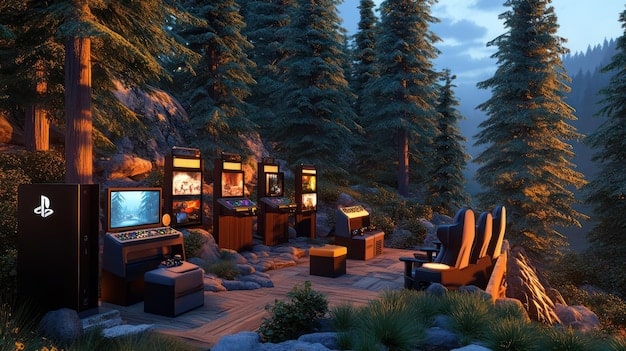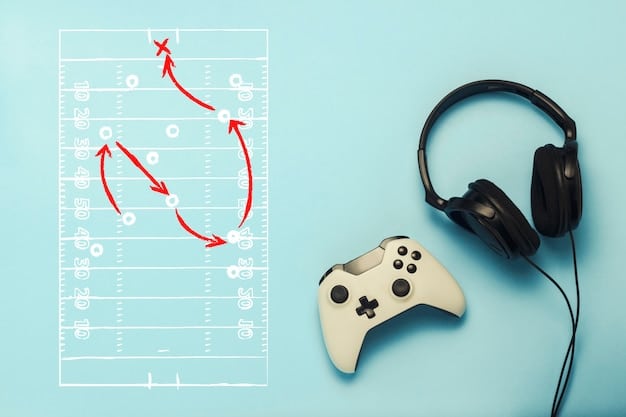Game Preservation on Consoles: Sony and Microsoft’s Digital Ownership Strategies

Game preservation on consoles is increasingly critical as digital ownership models evolve, prompting Sony and Microsoft to implement varied strategies to ensure access to purchased games and content remains secure for gamers.
As digital distribution reshapes how we own games, the question of long-term access arises: How are industry giants like Sony and Microsoft ensuring **game preservation on consoles** and addressing digital ownership concerns?
The Growing Importance of Game Preservation
Game preservation is no longer just a niche interest for collectors; it’s a critical issue for all gamers. As physical media gives way to digital downloads, the industry faces significant challenges in ensuring older titles remain accessible.
With the rise of digital distribution, games can disappear from storefronts, servers can shut down, and licensing agreements can expire, leaving players unable to access games they rightfully purchased. This reality underscores the urgency for proactive preservation strategies from console manufacturers like Sony and Microsoft.
Digital Ownership: A Shifting Landscape
The concept of digital ownership is evolving, and it impacts how consumers perceive their rights over purchased games. Unlike physical copies, digital games are tied to user accounts and platform ecosystems, creating dependencies on the infrastructure provided by Sony and Microsoft.
- Account Dependency: Access to purchased digital games is contingent on the user’s account status and the availability of the platform’s online services.
- Platform Ecosystems: Digital games are typically locked into specific console ecosystems, making it challenging to transfer them to alternative platforms or devices.
- Licensing Restrictions: Digital game licenses often come with restrictions on usage, such as limitations on sharing or transferring games to other users.
Ultimately, addressing these concerns requires ongoing efforts of console manufacturers to prioritize digital ownership and preservation.

Sony’s Approach to Game Preservation on PlayStation
Sony, with its PlayStation brand, faces the challenge of preserving a vast library of games across multiple console generations. Their approach involves various initiatives, including the emulation of classic titles, making older games available through subscription services, and maintaining the PlayStation Store, though it’s had a bumpy past.
However, concerns exist regarding the long-term sustainability of their current strategies and the extent to which they prioritize preserving lesser-known titles and niche experiences. These are often the titles which are lost to time.
PlayStation Plus and Classics Emulation
PlayStation Plus offers subscribers access to a curated list of classic PlayStation games through emulation. While this is a step in the right direction, the selection is limited, and not all games are available in their original form.
There are currently numerous titles from the first 3 generations of PlayStation that are currently unavailable for modern audiences.
- Curated Selection: Not all classic PlayStation games are available through PlayStation Plus, leading to concerns about missing gems and niche titles.
- Emulation Quality: Emulation quality can vary, potentially impacting the visual fidelity, performance, and authenticity of classic games.
- Subscription Dependency: Access to classic games is contingent on maintaining a PlayStation Plus subscription, raising questions about ownership and long-term access.
For example, older titles may suffer from low resolution or poorly mapped controls compared to their release state.
Microsoft’s Strategy for Xbox Game Preservation
Microsoft has adopted a different approach to game preservation on Xbox, emphasizing backward compatibility and cross-generational support. This strategy allows players to enjoy games from previous Xbox consoles on newer hardware, reducing the risk of games becoming inaccessible.
Backward compatibility has been lauded as a consumer-friendly approach, but it’s not without its limitations. Microsoft has to actively ensure older games work on newer hardware and that licensing agreements allow for their continued availability.

Backward Compatibility and Cross-Gen Support
Microsoft’s backward compatibility program enables players to enjoy select games from the original Xbox and Xbox 360 on Xbox One and Xbox Series X/S consoles. This initiative preserves the accessibility of older titles for modern audiences:
There are many other routes that Microsoft could take in order to ensure game preservation across its console platforms. They could emulate the route the company Nintendo has taken, for example.
- Extensive Library: Microsoft has made hundreds of games backward compatible, including a mix of popular and niche titles.
- Enhanced Performance: Backward compatible games often benefit from enhanced resolution, improved frame rates, and faster loading times on newer hardware.
- Cross-Gen Support: Microsoft continues to support backward compatibility on its latest consoles, demonstrating a long-term commitment to game preservation.
This approach is more sustainable and consumer-friendly.
Digital Ownership Concerns: A Shared Challenge
Both Sony and Microsoft face shared challenges regarding digital ownership. As digital distribution becomes increasingly prevalent, issues such as game delistings, server shutdowns, and account security can impact a player’s ability to access their purchased games.
The inherent lack of physical media in a digital-only world necessitates innovative and robust solutions to ensure that gamers retain the rights they expect when buying digital content. The road is long, and challenges persist.
Game Delistings and Server Shutdowns
Game delistings and server shutdowns can render digital games inaccessible, even if players have purchased them. These events can occur due to expiring licensing agreements, low player counts, or strategic decisions by publishers.
Game preservation continues to be threatened when entire distribution or server systems go offline, taking huge swathes of gaming history with them.
- Licensing Issues: Expiring licenses for music, trademarks, or characters can lead to delistings and the removal of games from digital storefronts.
- Server Maintenance: Maintaining servers for older games can be costly, leading publishers to shut them down and restrict access to online multiplayer features.
- Publisher Decisions: Publishers may choose to delist or discontinue games due to strategic reasons, such as focusing on newer titles or rebranding efforts.
Ultimately, the goal is to ensure ongoing accessibility to both large, medium, and small videogame titles without requiring users to engage in piracy.
Potential Solutions and Industry Best Practices
Addressing digital ownership concerns and achieving effective game preservation on consoles requires collaborative efforts from console manufacturers, publishers, and the gaming community. Industry best practices should prioritize consumer rights and long-term access to purchased content.
Here are potential solutions to keep the dream of preservation alive.
Digital Game Libraries and Archiving
Console manufacturers can establish digital game libraries and archival programs to preserve and provide access to older games. These initiatives would ensure that classic titles remain available for future generations of players.
Legal Frameworks for Game Preservation
Establishing legal frameworks may create exceptions for game preservation under copyright law, allowing enthusiasts to preserve and study older games without infringing on intellectual property rights.
This is a particularly important aspect that needs to be taken into account, as even the emulation of games can be considered to be a breach of copyright.
- Archival Exceptions: Legal exceptions can be created to allow libraries, museums, and other institutions to archive and preserve digital games for non-commercial purposes.
- Fair Use Guidelines: Guidelines can be established to clarify the boundaries of fair use for game preservation, such as allowing the creation of preservation copies or the modification of games for research purposes.
- Extended Copyright Terms: Copyright terms can be extended to prevent games from entering the public domain prematurely, ensuring that publishers have the necessary incentives to invest in preservation efforts.
These will help organizations take action to ensure game preservation.
The Role of Emulation and Fan Communities
Emulation and fan communities play a crucial role in game preservation. Emulators provide a means of playing older games on modern hardware, while fan communities contribute to archiving, modding, and documenting gaming history.
However, the legality of emulation remains a grey area, and console manufacturers could benefit from working with fan communities to develop more sustainable preservation practices.
- Emulator Development: Emulators are often created by hobbyists and enthusiasts and provide a means of playing older games on modern hardware, preserving their legacy.
- Fan Archiving: Fan communities actively archive and document gaming history, preserving ROMs, game manuals, and other related materials.
- Modding and Enhancement: Fan communities create mods and enhancements for older games, improving their visual quality, gameplay mechanics, and accessibility features.
There are risks with relying on fan communities, but the benefits are certainly there.
| Key Point | Brief Description |
|---|---|
| 🎮 Preservation Importance | Digital games are disappearing, underscoring the urgency for preservation. |
| 🤝 Sony’s Approach | Sony uses PlayStation Plus and emulation, but selection is limited. |
| ✅ Microsoft’s Strategy | Microsoft emphasizes backward compatibility for older Xbox titles. |
| 💾 Digital Solutions | Digital libraries and archival programs are proposed for accessibility. |
FAQ
▼
Game preservation on consoles ensures that classic and important games remain accessible to future generations, preventing them from being lost to time due to technological obsolescence or digital delisting.
▼
Sony uses PlayStation Plus to offer access to classic titles and emulation, but the selection is limited, and there are concerns about the long-term sustainability of these strategies.
▼
Microsoft focuses on backward compatibility, enabling players to enjoy games from previous Xbox consoles on newer hardware and enhancing their performance.
▼
Challenges include game delistings, server shutdowns, and licensing issues, which can make digital games inaccessible even after purchase. Security is also a factor for game preservation.
▼
Potential solutions include establishing digital game libraries and archival programs, creating legal exceptions for preservation, and promoting collaboration with fan communities and using emulation effectively.
Conclusion
As digital distribution increasingly dominates the console gaming landscape, the responsibility falls on industry leaders like Sony and Microsoft to prioritize game preservation. By embracing strategies like backward compatibility, emulation, and collaboration with fan communities, they can ensure that the rich history of console gaming remains accessible for future generations. The path forward requires a concerted effort to balance innovation with the enduring value of our gaming heritage.





